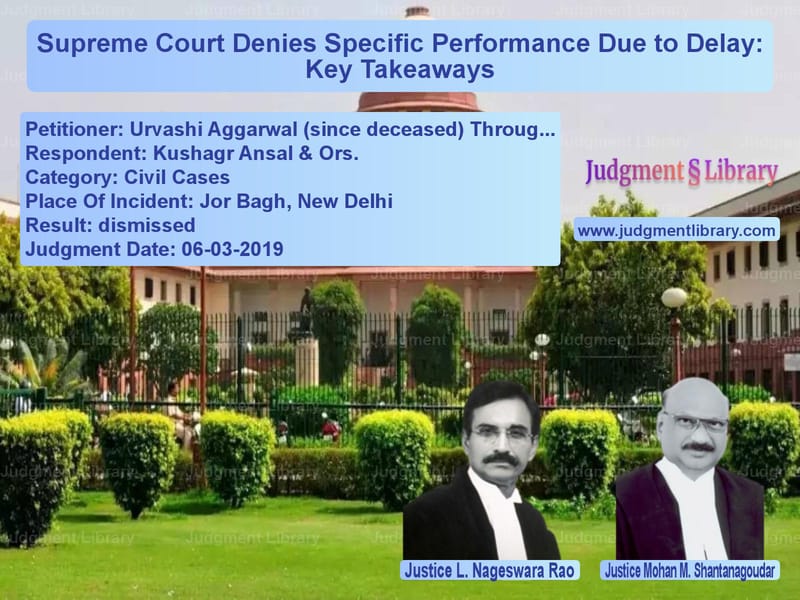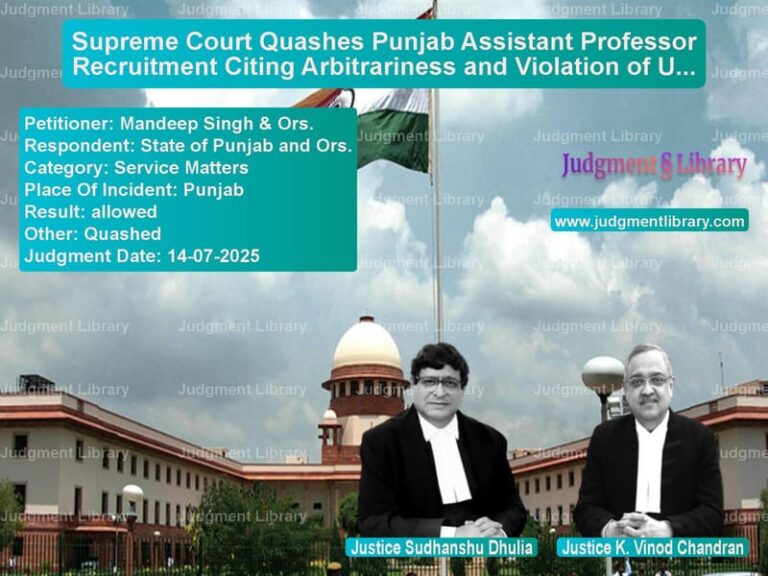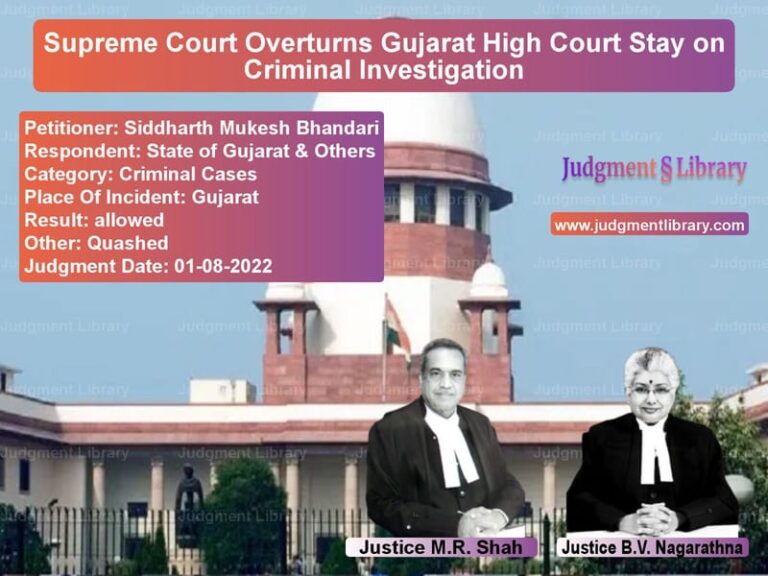Supreme Court Denies Specific Performance Due to Delay: Key Takeaways
The Supreme Court of India, in the case of Urvashi Aggarwal (since deceased) Through LRs & Anr. v. Kushagr Ansal & Ors., addressed a dispute over a property sale agreement. The case revolved around the plaintiffs’ claim for specific performance of an agreement to sell a property in Jor Bagh, New Delhi, executed in 1974. The plaintiffs sought enforcement of the agreement after a gap of 12 years, which led to a legal battle over limitation, readiness, and willingness to perform contractual obligations.
Background of the Case
The plaintiffs, Smt. Urvashi Aggarwal and her son Rajiv Chander Aggarwal, entered into an agreement with the original defendant, Smt. Suraj Kumari, on 05.10.1974, to purchase the property at a consideration of Rs. 1,85,000/-. The plaintiffs claimed to have paid Rs. 70,000/- in installments and alleged they were given proprietary possession of the premises.
The plaintiffs stated that the sale deed was to be executed after obtaining necessary permissions from the Land and Development Office (L&DO) and the Income Tax Department. They further alleged that they were tenants and later became the landlords, collecting rent from the ground-floor tenant. However, the defendants denied these claims and contended that the plaintiffs were not ready and willing to perform their obligations under the contract.
Petitioners’ Arguments
The plaintiffs made the following arguments in favor of specific performance:
- The agreement did not fix a definite time for execution, as it was contingent upon obtaining permissions from government authorities.
- The defendants continued to seek permissions from the L&DO, which implied that the agreement was still valid.
- The plaintiffs remained willing to perform their obligations and sought specific performance upon discovering the defendants’ refusal in 1987.
- The limitation period should start from the date of refusal (1987), making the suit timely.
Respondents’ Arguments
The defendants opposed the suit with the following contentions:
- The agreement fixed 31.03.1975 as the date for execution of the sale deed, and the plaintiffs failed to perform their obligations within the stipulated time.
- The plaintiffs never took possession as landlords, nor did they pay house tax or collect rent.
- The plaintiffs’ 12-year delay in filing the suit showed that they had abandoned the agreement.
- The suit was barred by limitation as per Article 54 of the Limitation Act, which prescribes a three-year period for filing such claims.
Supreme Court’s Findings
The Supreme Court, while affirming the judgments of the trial court and the High Court, ruled against the plaintiffs on key grounds:
1. Limitation
The Court held that the agreement explicitly fixed 31.03.1975 as the deadline for execution of the sale deed. According to Article 54 of the Limitation Act, the suit should have been filed within three years from this date, i.e., by 31.03.1978. Filing it in 1987 was too late. The Court noted:
“The cause of action has arisen on 31.03.1975 and the suit ought to have been filed within three years from that date. Admittedly, the suit was filed only in the year 1987.”
2. Readiness and Willingness
The Court found that the plaintiffs failed to prove their readiness and willingness to perform their part of the contract. Factors that weighed against them included:
- Non-payment of monthly installments as agreed in the contract.
- Failure to collect rent from the ground-floor tenant.
- Non-payment of house tax and ground rent, despite contractual obligations.
- Failure to initiate any legal steps to evict the tenant.
As per Section 16(c) of the Specific Relief Act, a party seeking specific performance must prove continued readiness and willingness to perform its contractual obligations. The Court held that the plaintiffs failed to meet this requirement.
3. Abandonment of Contract
The Court noted that the plaintiffs remained silent for 12 years, taking no legal action to enforce the contract. This inaction amounted to abandonment of the agreement. Citing the decision in K.S. Vidyanadam v. Vairavan (1997) 3 SCC 1, the Court held:
“Even where time is not of the essence of the contract, the plaintiffs must perform their part within a reasonable time.”
Final Judgment
The Supreme Court dismissed the appeal, upholding the findings of the lower courts. However, considering the amount paid by the plaintiffs (Rs. 70,000/- in 1975) and the subsequent rise in property prices, the Court awarded a refund of Rs. 2 crores instead of Rs. 70,000/- plus interest. The Court observed:
“In view of the peculiar facts of this case… we direct the defendants to pay Rs. 2,00,00,000/- (Rupees Two Crores) to the plaintiffs.”
Key Takeaways
- Strict Adherence to Limitation Period: The three-year limitation for specific performance claims must be followed strictly.
- Readiness and Willingness: Plaintiffs must show active efforts to fulfill their contractual obligations.
- Timely Legal Action is Crucial: Prolonged inaction, even without an explicit refusal from the other party, can be considered abandonment.
- Court’s Discretion in Compensation: The Court can grant reasonable monetary relief instead of specific performance in exceptional circumstances.
Conclusion
This case serves as an important precedent in contract law, particularly in property transactions. It highlights the significance of adhering to contractual timelines and the principle that courts will not enforce specific performance if a party has failed to act within a reasonable time. While the plaintiffs lost their claim for specific performance, the Court ensured fairness by granting a substantial monetary refund, acknowledging the appreciation in property value over the years.
Petitioner Name: Urvashi Aggarwal (since deceased) Through LRs & Anr..Respondent Name: Kushagr Ansal & Ors..Judgment By: Justice L. Nageswara Rao, Justice Mohan M. Shantanagoudar.Place Of Incident: Jor Bagh, New Delhi.Judgment Date: 06-03-2019.
Don’t miss out on the full details! Download the complete judgment in PDF format below and gain valuable insights instantly!
Download Judgment: Urvashi Aggarwal (si vs Kushagr Ansal & Ors. Supreme Court of India Judgment Dated 06-03-2019.pdf
Direct Downlaod Judgment: Direct downlaod this Judgment
See all petitions in Contract Disputes
See all petitions in Property Disputes
See all petitions in Specific Performance
See all petitions in Judgment by L. Nageswara Rao
See all petitions in Judgment by Mohan M. Shantanagoudar
See all petitions in dismissed
See all petitions in supreme court of India judgments March 2019
See all petitions in 2019 judgments
See all posts in Civil Cases Category
See all allowed petitions in Civil Cases Category
See all Dismissed petitions in Civil Cases Category
See all partially allowed petitions in Civil Cases Category







